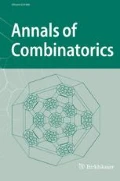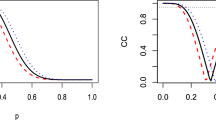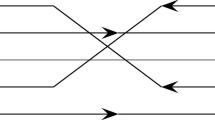Abstract
Loeb showed that a natural extension of the usual binomial coefficient to negative (integer) entries continues to satisfy many of the fundamental properties. In particular, he gave a uniform binomial theorem as well as a combinatorial interpretation in terms of choosing subsets of sets with a negative number of elements. We show that all of this can be extended to the case of Gaussian binomial coefficients. Moreover, we demonstrate that several of the well-known arithmetic properties of binomial coefficients also hold in the case of negative entries. In particular, we show that Lucas’ theorem on binomial coefficients modulo p not only extends naturally to the case of negative entries, but even to the Gaussian case.
Similar content being viewed by others
References
Adamczewski, B., Bell, J.P., Delaygue, É.: Algebraic independence of \({G}\)-functions and congruences “á la Lucas”. 1(52). https://doi.org/10.24033/asens.2392 (2016)
Adamczewski, B., Bell, J.P., Delaygue, É., Jouhet, F.: Congruences modulo cyclotomic polynomials and algebraic independence for \(q\)-series. Sém. Lothar. Combin. 78B, #A54 (2017)
Andrews, G.E.: \(q\)-Analogs of the binomial coefficient congruences of Babbage, Wolstenholme and Glaisher. Discrete Math. 204(1-3), 15–25 (1999)
Apéry, R.: Irrationalité de \(\zeta (2)\) et \(\zeta (3)\). Astérisque 61, 11–13 (1979)
Beukers, F.: Some congruences for the Apéry numbers. J. Number Theory 21(2), 141–155 (1985)
Coster, M.J.: Supercongruences. Ph.D Thesis, Universiteit Leiden (1988)
Désarménien, J.: Un analogue des congruences de Kummer pour les \(q\)-nombres d’Euler. European J. Combin. 3(1), 19–28 (1982)
Fowler, D.: The binomial coefficient function. Amer. Math. Monthly 103(1), 1–17 (1996)
Gasper, G., Rahman, M.: Basic Hypergeometric Series. Cambridge University Press, Cambridge (1990)
Hu, H., Sun, Z.-W.: An extension of Lucas’ theorem. Proc. Amer. Math. Soc. 129(12), 3471–3478 (2001)
Kac, V., Cheung, P.: Quantum Calculus. Universitext. Springer-Verlag, New York (2002)
Knuth, D.E.: The Art of Computer Programming. Vol. 1. Fundamental Algorithms. Third Edition. Addison-Wesley, Reading, MA (1997)
Knuth, D.E., Wilf, H.S.: The power of a prime that divides a generalized binomial coefficient. J. Reine Angew. Math. 396, 212–219 (1989)
Loeb, D.: Sets with a negative number of elements. Adv. Math. 91(1), 64–74 (1992)
Lucas, E.: Sur les congruences des nombres eulériens et les coefficients différentiels des functions trigonométriques suivant un module premier. Bull. Soc. Math. France 6, 49–54 (1878)
Olive, G.: Generalized powers. Amer. Math. Monthly 72, 619–627 (1965)
Sagan, B.E.: Congruence properties of \(q\)-analogs. Adv. Math. 95(1), 127–143 (1992)
Schlosser, M.J.: A noncommutative weight-dependent generalization of the binomial theorem. arXiv:1106.2112 (2011)
Sprugnoli, R.: Negation of binomial coefficients. Discrete Math. 308(22), 5070–5077 (2008)
Straub, A.: A \(q\)-analog of Ljunggren’s binomial congruence. In: 23rd International Conference on Formal Power Series and Algebraic Combinatorics (FPSAC 2011), pp. 897–902. Discrete Math. Theor. Comput. Sci. Proc., AO, Assoc. Discrete Math. Theor. Comput. Sci., Nancy (2011)
Straub, A.: Multivariate Apéry numbers and supercongruences of rational functions. Algebra Number Theory 8(8), 1985–2007 (2014)
Acknowledgements
Part of this work was completed while the first author was supported by a Summer Undergraduate Research Fellowship (SURF) through the Office of Undergraduate Research (OUR) at the University of South Alabama. We are grateful to Wadim Zudilin for helpful comments on an earlier draft of this paper, as well as to the referee who provided useful historical remarks. We also thank Boris Adamczewski, Jason P. Bell, Éric Delaygue, and Frédéric Jouhet for pointing out the connection between Theorem 7.2 and the results in [2] (see the comments included after Theorem 7.2).
Author information
Authors and Affiliations
Corresponding author
Additional information
Dedicated to Professor George Andrews on the occasion of his eightieth birthday
Publisher's Note
Springer Nature remains neutral with regard to jurisdictional claims in published maps and institutional affiliations.
Rights and permissions
About this article
Cite this article
Formichella, S., Straub, A. Gaussian Binomial Coefficients with Negative Arguments. Ann. Comb. 23, 725–748 (2019). https://doi.org/10.1007/s00026-019-00472-5
Received:
Accepted:
Published:
Issue Date:
DOI: https://doi.org/10.1007/s00026-019-00472-5




